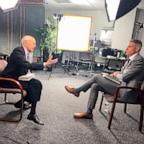Visa and MasterCard: Look beyond the price
— -- A: Your question highlights one of the dangers of looking only at a stock's price.
At first glance, it would appear Visa's stock price needs to catch up with MasterCard's. After all, MasterCard trades for more than $125 a share while Visa is around $45 a share.
But a stock's share price, by itself, doesn't tell you anything about the value of the company. You need to look at a company's market value, that is the stock price multiplied by the number of shares outstanding, to get any useful information.
And on this basis, Visa has a much higher valuation, with a market value of $37 billion vs. MasterCard's market value of $12 billion.
Confused? Let's say there are two pizza shops next to each other. One advertises slices of pizza for $1 and the other $2. Does that mean that the $1 pizza shop is a better deal? Not necessarily.
In addition to taste and quality, you need to consider how big the slices of pizza are. What if the $1 pizza shop is selling tiny slivers of pizza, while you can get a quarter of a pie for $2 at the other place? Suddenly, the $1 piece of pizza doesn't look like such a good deal. At $2 a slice, you would be paying $8 for the whole pizza. And at $1 for a skinny slice, you're paying $10 for the whole pizza.
The same goes for slices, or shares, of companies. You need to consider what that stock price means by looking at what you're paying for. That's where market value comes in.
Another way to compare companies' values is the price-to-earnings ratio, or P-E. It is simply a stock's price divided by its earnings per share.
P-E is a measure of how much you are paying for a company's earnings. The higher the P/E, the more "expensive" the stock.
Visa, for instance, sports a P-E of 45.8. So by buying a share of Visa stock, you are paying almost $46 for $1 of earnings.
Mastercard, by contrast, does not have a P-E. That's because the company lost money the past twelve months, including net losses of $746.7 million in the June quarter and $193.6 million in the September quarter.




